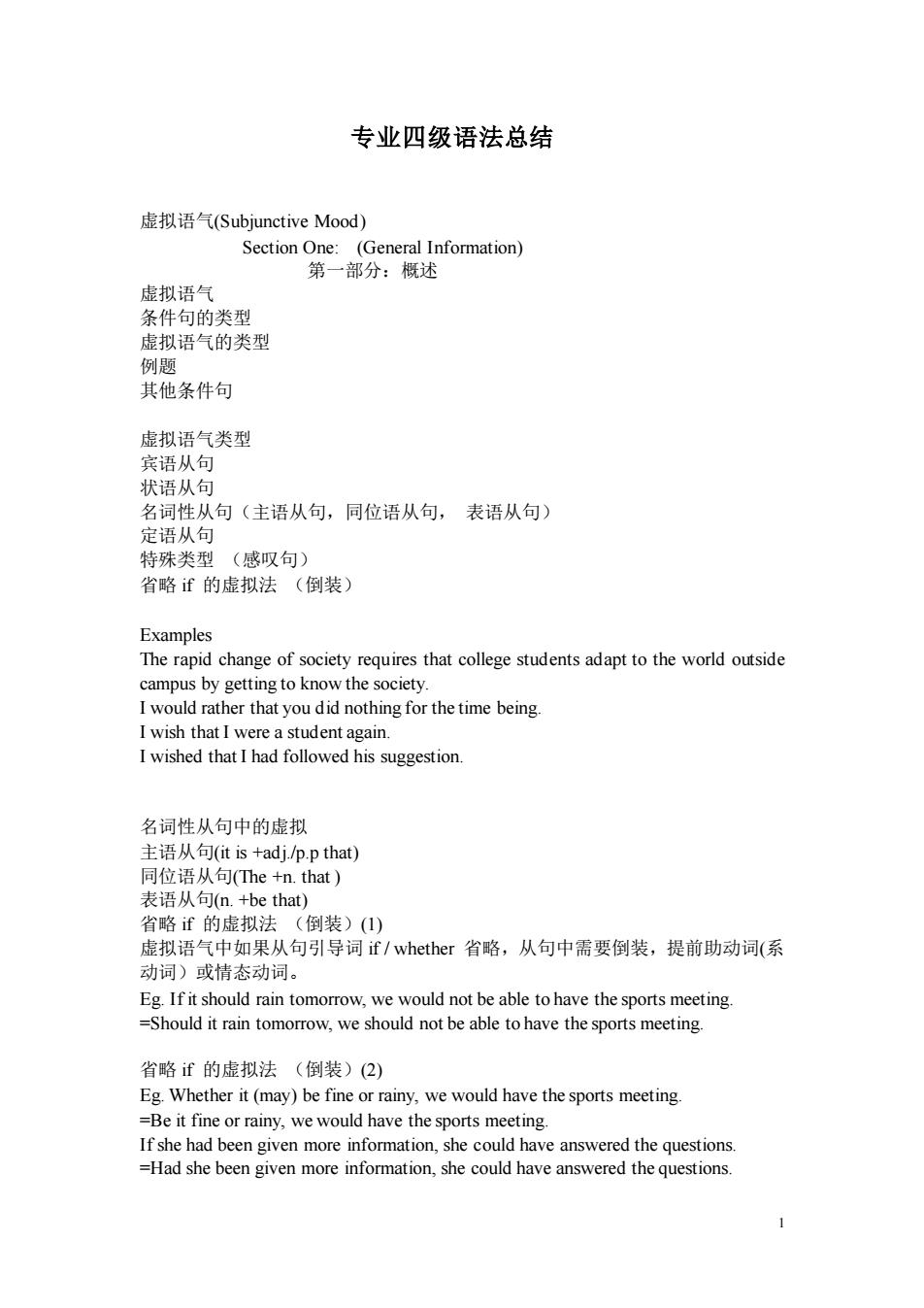
专业四级语法总结虚拟语气(SubjunctiveMood)SectionOne:(General Information)第一部分:概述虚拟语气条件句的类型虚拟语气的类型例题其他条件句虚拟语气类型宾语从句状语从句名词性从句(主语从句,同位语从句,表语从句)定语从句特殊类型(感叹句)省略if的虚拟法(倒装)ExamplesThe rapid change of society requires that college students adapt to the world outsidecampus bygettingtoknowthe society.I would rather that you did nothing for the time beingI wish that I were a student again.I wished that I had followed his suggestion.名词性从句中的虚拟主语从句(itis+adj./p.pthat)同位语从句(The+n.that)表语从句(n.+bethat)省略if的虚拟法(倒装)(1)虚拟语气中如果从句引导词if/whether省略,从句中需要倒装,提前助动词(系动词)或情态动词。Eg. If it should rain tomorrow, we would not be able to have the sports meeting.=Should it rain tomorrow, we should notbe ableto have the sports meeting省略if的虚拟法(倒装)(②)Eg. Whether it (may) be fine or rainy, we would have the sports meeting.=Be it fine or rainy, we would have the sports meetingIfshehadbeengivenmoreinformation,shecouldhaveansweredthequestions=Had she been given more information, she could have answered the questions1
1 专业四级语法总结 虚拟语气(Subjunctive Mood) Section One: (General Information) 第一部分:概述 虚拟语气 条件句的类型 虚拟语气的类型 例题 其他条件句 虚拟语气类型 宾语从句 状语从句 名词性从句(主语从句,同位语从句, 表语从句) 定语从句 特殊类型 (感叹句) 省略 if 的虚拟法 (倒装) Examples The rapid change of society requires that college students adapt to the world outside campus by getting to know the society. I would rather that you did nothing for the time being. I wish that I were a student again. I wished that I had followed his suggestion. 名词性从句中的虚拟 主语从句(it is +adj./p.p that) 同位语从句(The +n. that ) 表语从句(n. +be that) 省略 if 的虚拟法 (倒装)(1) 虚拟语气中如果从句引导词 if / whether 省略,从句中需要倒装,提前助动词(系 动词)或情态动词。 Eg. If it should rain tomorrow, we would not be able to have the sports meeting. =Should it rain tomorrow, we should not be able to have the sports meeting. 省略 if 的虚拟法 (倒装)(2) Eg. Whether it (may) be fine or rainy, we would have the sports meeting. =Be it fine or rainy, we would have the sports meeting. If she had been given more information, she could have answered the questions. =Had she been given more information, she could have answered the questions
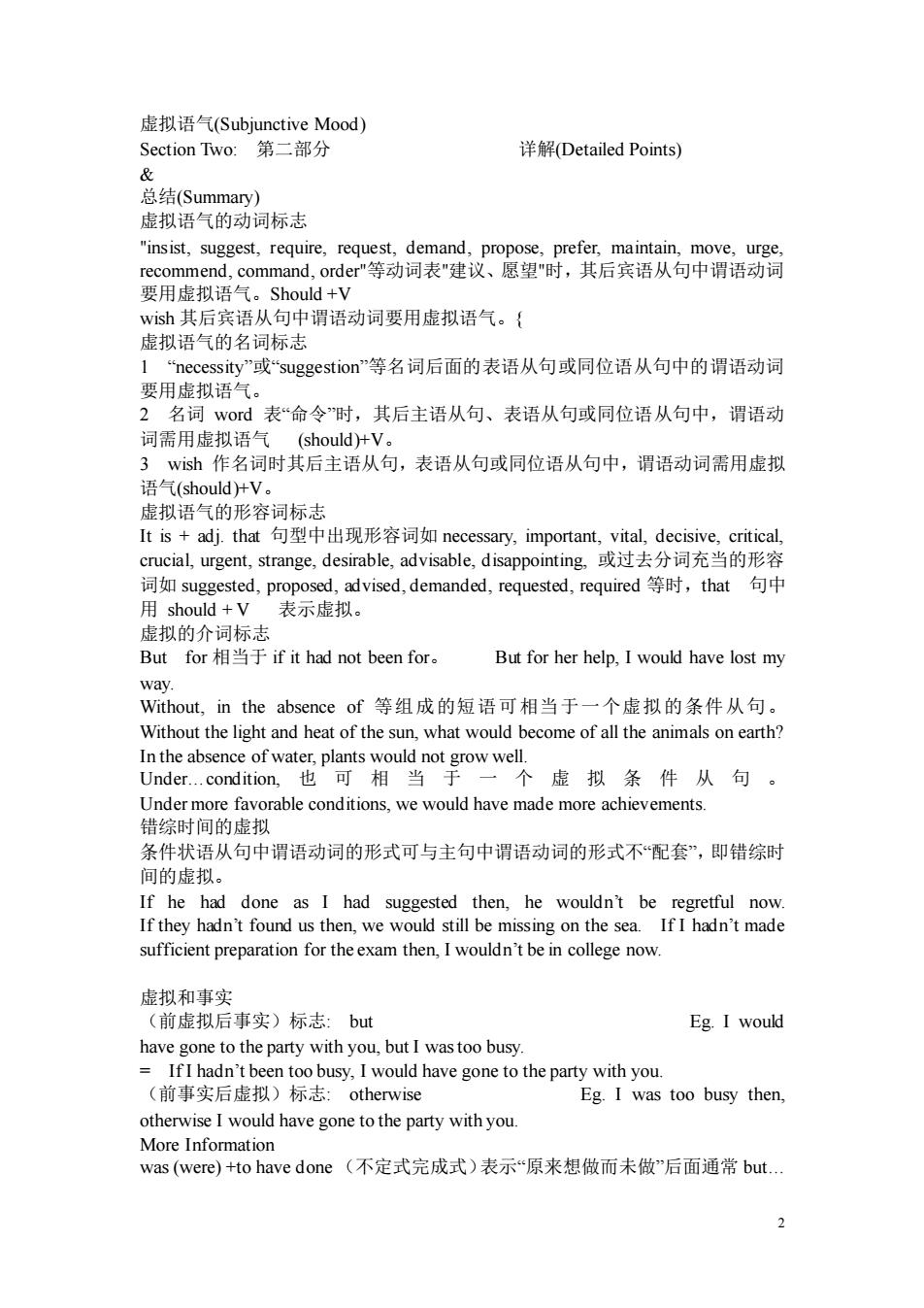
虚拟语气(SubjunctiveMood)SectionTwo:第二部分详解(DetailedPoints)&总结(Summary)虚拟语气的动词标志"insist, suggest, require, request, demand, propose, prefer, maintain, move, urge,recommend,command,order"等动词表"建议、愿望"时,其后宾语从句中谓语动词要用虚拟语气。Should+Vwish其后宾语从句中谓语动词要用虚拟语气。(虚拟语气的名词标志1“necessity"或“suggestion"等名词后面的表语从句或同位语从句中的谓语动词要用虚拟语气。2名词word表“命令"时,其后主语从句、表语从句或同位语从句中,谓语动词需用虚拟语气(should)+V。3wish作名词时其后主语从句,表语从句或同位语从句中,谓语动词需用虚拟语气(should)+V。虚拟语气的形容词标志Itis+adj.that句型中出现形容词如necessary,important,vitaldecisive,critical,crucial,urgent,strange,desirableadvisable,disappointing,或过去分词充当的形容词如suggested,proposed,advised,demanded,requested,required等时,that句中用should+V表示虚拟。虚拟的介词标志Butfor相当于ifithadnotbeenfor。But for her help, I would have lost mywayWithout,inthe absence of等组成的短语可相当于一个虚拟的条件从句。Withoutthelight and heat of the sun,what would becomeof all the animals onearth?In the absence of water,plantswould not grow well.Under..condition,也可相当于一个虚拟条件从句Under more favorable conditions, we would have made more achievements.错综时间的虚拟条件状语从句中谓语动词的形式可与主句中谓语动词的形式不“配套”,即错综时间的虚拟。If he had done as I had suggested then, he wouldn't be regretful now.If they hadn't found us then, we would still be missing on the sea.IfI hadn't madesufficientpreparationfortheexamthen,Iwouldn'tbeincollegenow.虚拟和事实(前虚拟后事实)标志:butEg.I wouldhave gone to the party with you, but I was too busy.=IfI hadn't been too busy, I would have gone to the party with you.(前事实后虚拟)标志:otherwiseEg. I was too busy then,otherwise I would have gone to the party with you.MoreInformationwas(were)+tohavedone(不定式完成式)表示“原来想做而未做"后面通常but..2
2 虚拟语气(Subjunctive Mood) Section Two: 第二部分 详解(Detailed Points) & 总结(Summary) 虚拟语气的动词标志 "insist, suggest, require, request, demand, propose, prefer, maintain, move, urge, recommend, command, order"等动词表"建议、愿望"时,其后宾语从句中谓语动词 要用虚拟语气。Should +V wish 其后宾语从句中谓语动词要用虚拟语气。{ 虚拟语气的名词标志 1 “necessity”或“suggestion”等名词后面的表语从句或同位语从句中的谓语动词 要用虚拟语气。 2 名词 word 表“命令”时,其后主语从句、表语从句或同位语从句中,谓语动 词需用虚拟语气 (should)+V。 3 wish 作名词时其后主语从句,表语从句或同位语从句中,谓语动词需用虚拟 语气(should)+V。 虚拟语气的形容词标志 It is + adj. that 句型中出现形容词如 necessary, important, vital, decisive, critical, crucial, urgent, strange, desirable, advisable, disappointing, 或过去分词充当的形容 词如 suggested, proposed, advised, demanded, requested, required 等时,that 句中 用 should + V 表示虚拟。 虚拟的介词标志 But for 相当于 if it had not been for。 But for her help, I would have lost my way. Without, in the absence of 等组成的短语可相当于一个虚拟的条件从句。 Without the light and heat of the sun, what would become of all the animals on earth? In the absence of water, plants would not grow well. Under.condition, 也可相当于一个虚拟条件从句。 Under more favorable conditions, we would have made more achievements. 错综时间的虚拟 条件状语从句中谓语动词的形式可与主句中谓语动词的形式不“配套”,即错综时 间的虚拟。 If he had done as I had suggested then, he wouldn’t be regretful now. If they hadn’t found us then, we would still be missing on the sea. If I hadn’t made sufficient preparation for the exam then, I wouldn’t be in college now. 虚拟和事实 (前虚拟后事实)标志: but Eg. I would have gone to the party with you, but I was too busy. = If I hadn’t been too busy, I would have gone to the party with you. (前事实后虚拟)标志: otherwise Eg. I was too busy then, otherwise I would have gone to the party with you. More Information was (were) +to have done (不定式完成式)表示“原来想做而未做”后面通常 but
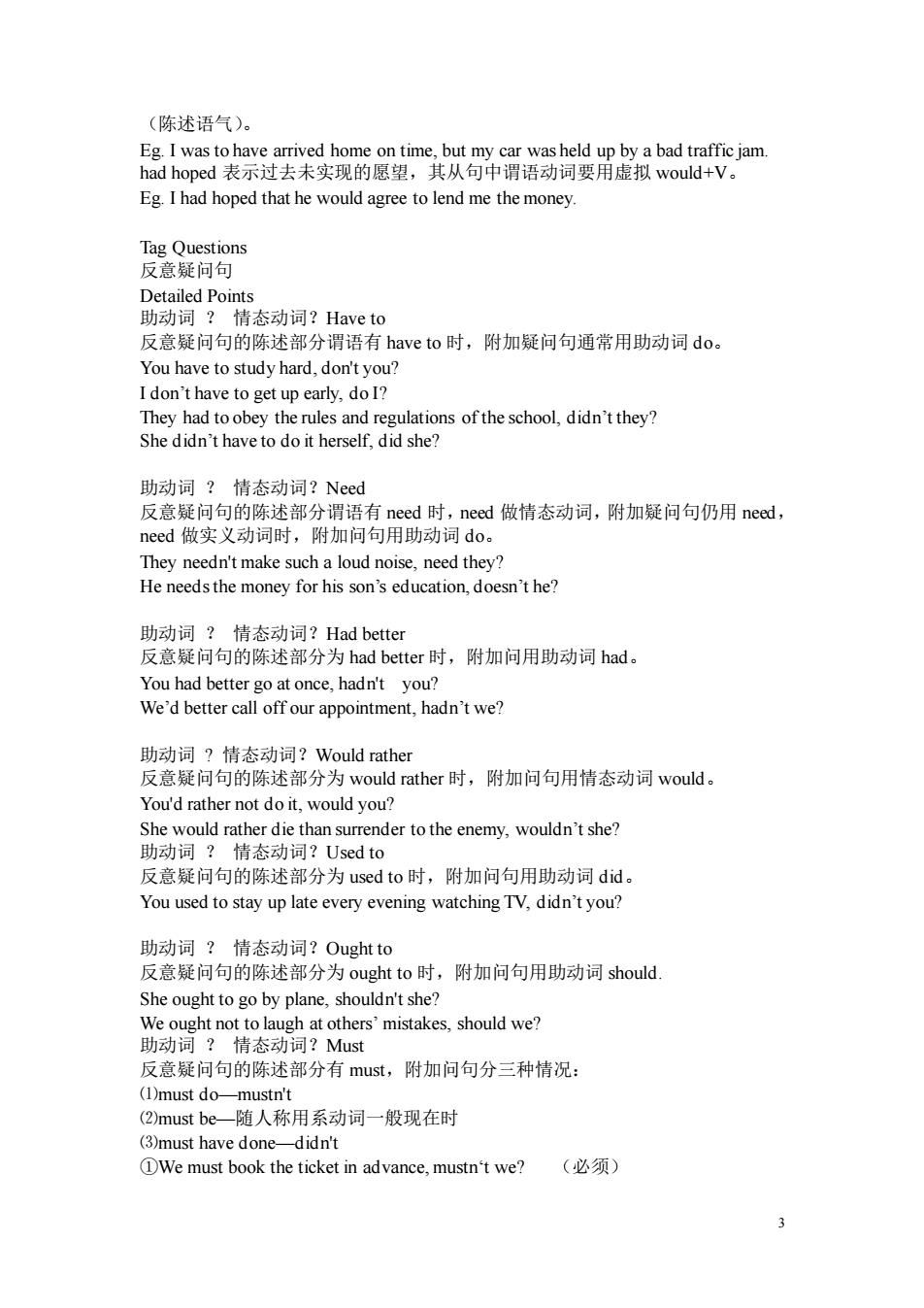
(陈述语气)。Eg.I was to have arrived home on time, but my car was held up by a bad traffic jamhadhoped表示过去未实现的愿望,其从句中谓语动词要用虚拟would+V。Eg. I had hoped that he would agree to lend me the money.Tag Questions反意疑问句Detailed Points助动词?情态动词?Haveto反意疑问句的陈述部分谓语有haveto时,附加疑问句通常用助动词do。You have to study hard, don't you?I don't have to get up early, do I?They had to obey the rules and regulations of the school, didn't they?She didn't have to do it herself, did she?助动词?情态动词?Need反意疑问句的陈述部分谓语有need时,need做情态动词,附加疑问句仍用need,need做实义动词时,附加问句用助动词do。They needn't make such a loud noise, need they?He needs the money for his son's education, doesn't he?助动词?情态动词?Hadbetter反意疑问句的陈述部分为hadbetter时,附加问用助动词had。You had better go at once, hadn't you?We'd better call off our appointment, hadn't we?助动词?情态动词?Wouldrather反意疑问句的陈述部分为wouldrather时,附加问句用情态动词would。You'd rather not do it, would you?She would rather die than surrender to the enemy, wouldn't she?助动词?情态动词?Usedto反意疑问句的陈述部分为usedto时,附加问句用助动词did。You used to stay up late every evening watching TV, didn't you?助动词?情态动词?Oughtto反意疑问句的陈述部分为oughtto时,附加问句用助动词shouldShe ought to go by plane, shouldn't she?We ought not to laugh at others'mistakes, should we?助动词?情态动词?Must反意疑问句的陈述部分有must,附加问句分三种情况:(1)mustdo-mustn't(2)mustbe一随人称用系动词一般现在时(3)must have donedidn't(必须)We must book the ticket in advance, mustn't we?3
3 (陈述语气)。 Eg. I was to have arrived home on time, but my car was held up by a bad traffic jam. had hoped 表示过去未实现的愿望,其从句中谓语动词要用虚拟 would+V。 Eg. I had hoped that he would agree to lend me the money. Tag Questions 反意疑问句 Detailed Points 助动词 ? 情态动词?Have to 反意疑问句的陈述部分谓语有 have to 时,附加疑问句通常用助动词 do。 You have to study hard, don't you? I don’t have to get up early, do I? They had to obey the rules and regulations of the school, didn’t they? She didn’t have to do it herself, did she? 助动词 ? 情态动词?Need 反意疑问句的陈述部分谓语有 need 时,need 做情态动词,附加疑问句仍用 need, need 做实义动词时,附加问句用助动词 do。 They needn't make such a loud noise, need they? He needs the money for his son’s education, doesn’t he? 助动词 ? 情态动词?Had better 反意疑问句的陈述部分为 had better 时,附加问用助动词 had。 You had better go at once, hadn't you? We’d better call off our appointment, hadn’t we? 助动词 ? 情态动词?Would rather 反意疑问句的陈述部分为 would rather 时,附加问句用情态动词 would。 You'd rather not do it, would you? She would rather die than surrender to the enemy, wouldn’t she? 助动词 ? 情态动词?Used to 反意疑问句的陈述部分为 used to 时,附加问句用助动词 did。 You used to stay up late every evening watching TV, didn’t you? 助动词 ? 情态动词?Ought to 反意疑问句的陈述部分为 ought to 时,附加问句用助动词 should. She ought to go by plane, shouldn't she? We ought not to laugh at others’ mistakes, should we? 助动词 ? 情态动词?Must 反意疑问句的陈述部分有 must,附加问句分三种情况: ⑴must do—mustn't ⑵must be—随人称用系动词一般现在时 ⑶must have done—didn't ①We must book the ticket in advance, mustn‘t we? (必须)
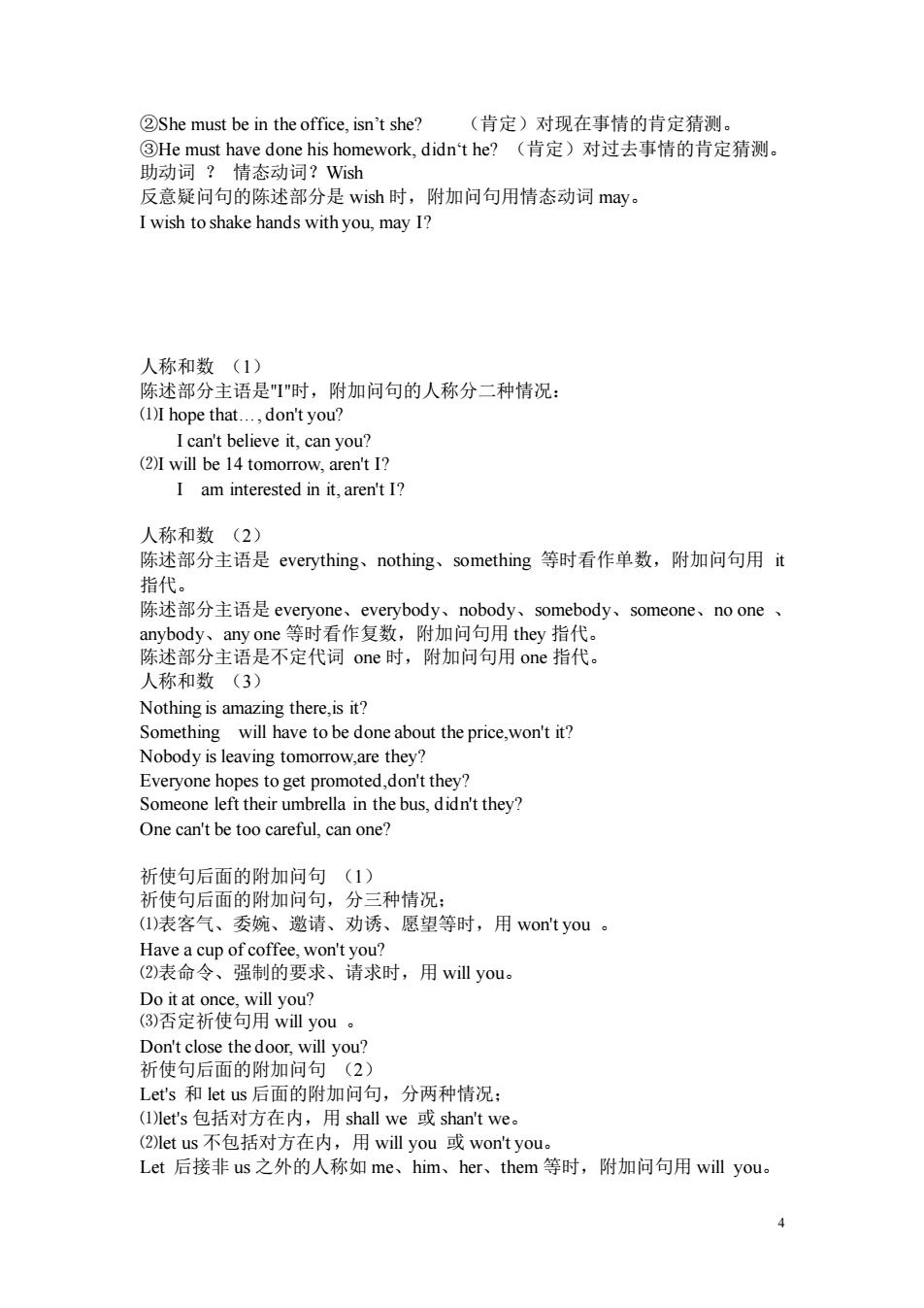
②She must be in the office, isn't she?(肯定)对现在事情的肯定猜测。③Hemusthavedonehishomework,didn'the?(肯定)对过去事情的肯定猜测。助动词?情态动词?Wish反意疑问句的陈述部分是wish时,附加问句用情态动词may。I wish to shake hands with you, may I?人称和数(1)陈述部分主语是"I"时,附加问句的人称分二种情况:(1)I hope that..., don't you?I can't believe it, can you?(2)I will be 14 tomorrow, aren't I?I am interested in it, aren't I?人称和数(2)陈述部分主语是everything、nothing、something等时看作单数,附加问句用it指代。陈述部分主语是everyone、everybody、nobody、somebody、someone、noone、anybody、anyone等时看作复数,附加问句用they指代。陈述部分主语是不定代词one时,附加问句用one指代。人称和数(3)Nothing is amazing there,is it?Somethingwill have to be done about the price,won't it?Nobodyisleavingtomorrow,arethey?Everyone hopes to get promoted,don't they?Someonelefttheirumbrella inthebus,didn'tthey?Onecan'tbetoocareful,canone?祈使句后面的附加问句(1)祈使句后面的附加问句,分三种情况(1)表客气、委婉、邀请、劝诱、愿望等时,用won'tyou。Have a cup of coffee, won't you?(2)表命令、强制的要求、请求时,用will you。Do it at once, will you?(3)否定祈使句用willyou。Don't close the door, will you?祈使句后面的附加问句(2)Let's和letus后面的附加问句,分两种情况;(1)let's包括对方在内,用shallwe或shan'twe。(2)letus不包括对方在内,用willyou或wontyou。Let后接非us之外的人称如me、him、her、them等时,附加问句用willyou。4
4 ②She must be in the office, isn’t she? (肯定)对现在事情的肯定猜测。 ③He must have done his homework, didn‘t he? (肯定)对过去事情的肯定猜测。 助动词 ? 情态动词?Wish 反意疑问句的陈述部分是 wish 时,附加问句用情态动词 may。 I wish to shake hands with you, may I? 人称和数 (1) 陈述部分主语是"I"时,附加问句的人称分二种情况: ⑴I hope that., don't you? I can't believe it, can you? ⑵I will be 14 tomorrow, aren't I? I am interested in it, aren't I? 人称和数 (2) 陈述部分主语是 everything、nothing、something 等时看作单数,附加问句用 it 指代。 陈述部分主语是 everyone、everybody、nobody、somebody、someone、no one 、 anybody、any one 等时看作复数,附加问句用 they 指代。 陈述部分主语是不定代词 one 时,附加问句用 one 指代。 人称和数 (3) Nothing is amazing there,is it? Something will have to be done about the price,won't it? Nobody is leaving tomorrow,are they? Everyone hopes to get promoted,don't they? Someone left their umbrella in the bus, didn't they? One can't be too careful, can one? 祈使句后面的附加问句 (1) 祈使句后面的附加问句,分三种情况; ⑴表客气、委婉、邀请、劝诱、愿望等时,用 won't you 。 Have a cup of coffee, won't you? ⑵表命令、强制的要求、请求时,用 will you。 Do it at once, will you? ⑶否定祈使句用 will you 。 Don't close the door, will you? 祈使句后面的附加问句 (2) Let's 和 let us 后面的附加问句,分两种情况; ⑴let's 包括对方在内,用 shall we 或 shan't we。 ⑵let us 不包括对方在内,用 will you 或 won't you。 Let 后接非 us 之外的人称如 me、him、her、them 等时,附加问句用 will you
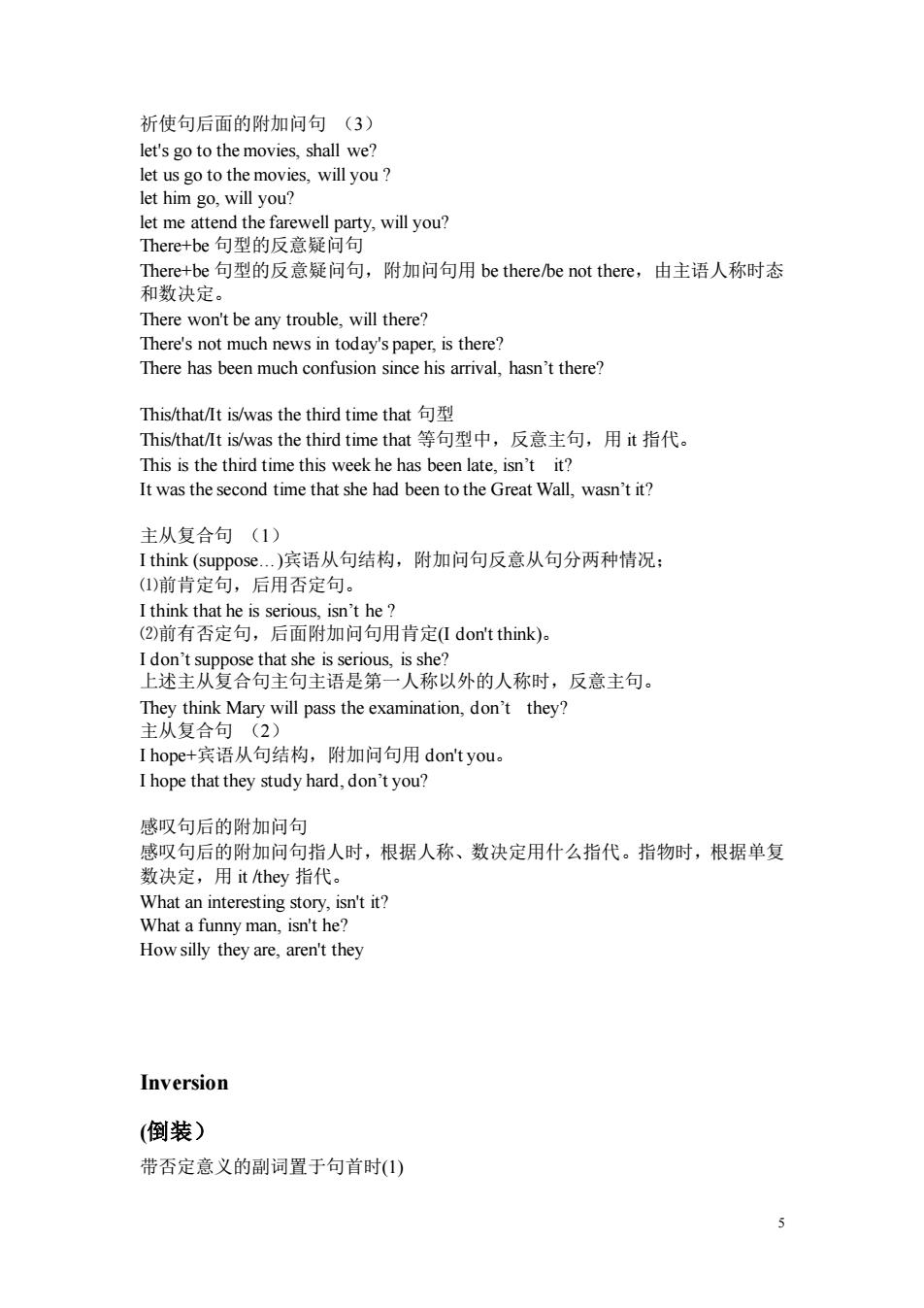
祈使句后面的附加问句(3)let's go to the movies, shall we?let us go to the movies, will you ?let him go, will you?letmeattendthefarewellparty,willyou?There+be句型的反意疑问句There+be句型的反意疑问句,附加问句用bethere/benotthere,由主语人称时态和数决定。There won't be any trouble, will there?There's not much news in today's paper, is there?There has been much confusion since his arrival, hasn't there?This/that/lt is/was thethird timethat句型This/that/Itis/wasthethirdtimethat等句型中,反意主句,用it指代。This isthethird timethis week hehas beenlate,isn'tit?Itwasthesecondtimethat shehadbeentotheGreatWall, wasn't it?主从复合句(1)Ithink(suppose...)宾语从句结构,附加问句反意从句分两种情况;(1)前肯定句,后用否定句。I think that he is serious, isn't he?(2)前有否定句,后面附加问句用肯定(Idon'tthink)。I don't suppose that she is serious, is she?上述主从复合句主句主语是第一人称以外的人称时,反意主句。They think Mary will pass the examination, don't they?主从复合句(2Ihope+宾语从句结构,附加问句用don'tyou。I hopethattheystudyhard,don'tyou?感叹句后的附加问句感叹句后的附加问句指人时,根据人称、数决定用什么指代。指物时,根据单复数决定,用it/they指代。What an interesting story, isn't it?What a funny man, isn't he?How silly they are, aren't theyInversion(倒装)带否定意义的副词置于句首时(1)5
5 祈使句后面的附加问句 (3) let's go to the movies, shall we? let us go to the movies, will you ? let him go, will you? let me attend the farewell party, will you? There+be 句型的反意疑问句 There+be 句型的反意疑问句,附加问句用 be there/be not there,由主语人称时态 和数决定。 There won't be any trouble, will there? There's not much news in today's paper, is there? There has been much confusion since his arrival, hasn’t there? This/that/It is/was the third time that 句型 This/that/It is/was the third time that 等句型中,反意主句,用 it 指代。 This is the third time this week he has been late, isn’t it? It was the second time that she had been to the Great Wall, wasn’t it? 主从复合句 (1) I think (suppose.)宾语从句结构,附加问句反意从句分两种情况; ⑴前肯定句,后用否定句。 I think that he is serious, isn’t he ? ⑵前有否定句,后面附加问句用肯定(I don't think)。 I don’t suppose that she is serious, is she? 上述主从复合句主句主语是第一人称以外的人称时,反意主句。 They think Mary will pass the examination, don’t they? 主从复合句 (2) I hope+宾语从句结构,附加问句用 don't you。 I hope that they study hard, don’t you? 感叹句后的附加问句 感叹句后的附加问句指人时,根据人称、数决定用什么指代。指物时,根据单复 数决定,用 it /they 指代。 What an interesting story, isn't it? What a funny man, isn't he? How silly they are, aren't they Inversion (倒装) 带否定意义的副词置于句首时(1)